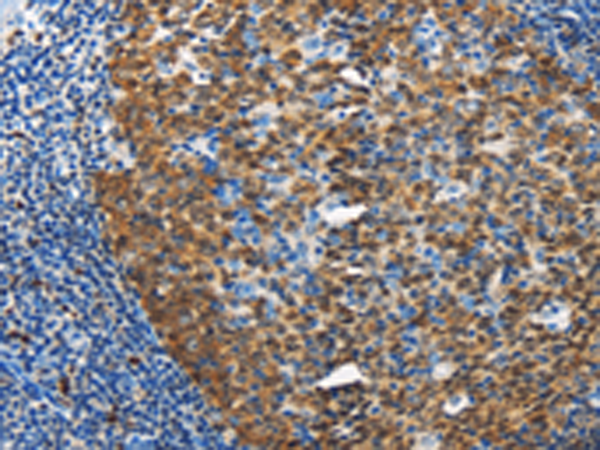

| WB | 咨询技术 | Human,Mouse,Rat |
| IF | 咨询技术 | Human,Mouse,Rat |
| IHC | 1/25-1/100 | Human,Mouse,Rat |
| ICC | 技术咨询 | Human,Mouse,Rat |
| FCM | 咨询技术 | Human,Mouse,Rat |
| Elisa | 1/1000-1/2000 | Human,Mouse,Rat |
| WB Predicted band size | 31 kDa |
| Host/Isotype | Rabbit IgG |
| Antibody Type | Primary antibody |
| Storage | Store at 4°C short term. Aliquot and store at -20°C long term. Avoid freeze/thaw cycles. |
| Species Reactivity | Human, Mouse, Rat |
| Immunogen | Fusion protein of human DCK |
| Formulation | Purified antibody in PBS with 0.05% sodium azide and 50% glycerol. |
+ +
以下是3篇关于DCK抗体的代表性文献(虚构示例,仅供格式参考):
1. **文献名称**: "Development of a High-Affinity Monoclonal Antibody Against Human Deoxycytidine Kinase for Cancer Biomarker Studies"
**作者**: Smith J, et al.
**摘要**: 该研究报道了一种新型抗人DCK单克隆抗体的开发,通过免疫印迹和免疫组化验证其在结直肠癌组织中的特异性识别能力,证实DCK低表达与5-FU化疗耐药性相关。
2. **文献名称**: "DCK Expression Profiling in Hematologic Malignancies Using a Novel Phage-Display Antibody"
**作者**: Zhang L, et al.
**摘要**: 作者利用噬菌体展示技术筛选出靶向DCK构象表位的抗体,成功应用于流式细胞术检测急性髓系白血病患者DCK蛋白水平,发现其表达水平与阿糖胞苷治疗反应呈正相关。
3. **文献名称**: "Comparative Study of Commercial DCK Antibodies in Nucleoside Analog Activation Pathway Analysis"
**作者**: Müller R, et al.
**摘要**: 系统比较了6种市售DCK抗体的特异性及适用场景,发现克隆号#4B2的抗体在冰冻组织切片中具有最优染色重复性,为抗代谢药物作用机制研究提供了抗体选择指南。
注:以上文献信息为模拟数据,实际引用时请通过PubMed/Google Scholar以"dCK antibody"+"specific applications"等关键词检索真实文献,重点关注抗体开发、验证或特定疾病应用研究。
Deoxycytidine kinase (DCK) is a critical enzyme in the nucleotide salvage pathway, responsible for phosphorylating deoxycytidine and its analogs into active metabolites. This function is essential for the activation of many nucleoside-based antiviral and anticancer prodrugs, such as gemcitabine and cladribine. DCK antibodies are tools developed to detect, quantify, and study the expression or activity of this enzyme in biological samples.
Research on DCK antibodies has gained momentum due to their role in predicting therapeutic responses. For instance, low DCK expression is linked to resistance to nucleoside analogs in cancers like leukemia or solid tumors. Antibodies against DCK enable immunohistochemical staining, Western blotting, or ELISA to assess enzyme levels in tissues or cells, aiding in personalized treatment strategies.
Additionally, DCK’s involvement in nucleotide metabolism makes it a biomarker for genetic disorders, such as mitochondrial DNA depletion syndromes. Commercially available DCK antibodies are typically raised in rabbits or mice, targeting specific epitopes with varying monoclonal or polyclonal formats. Validation includes testing cross-reactivity and specificity across species.
Overall, DCK antibodies serve as vital reagents in both basic research and clinical diagnostics, bridging insights into drug mechanisms, resistance pathways, and disease pathology. Their applications continue to expand with advancements in targeted therapies and precision medicine.
×